When choosing the ideal eCommerce platform for your business, Magento vs Volusion are the two outstanding options. Both platforms are well-known in the industry and offer unique features. However, their differences can greatly impact your store's performance and management.
In this article, we will explore all the differences between Magento vs Volusion based on several criteria, including:
- Pricing
- Ease of use
- Inventory management
- B2B features
- Payment options
- Themes and templates
- SEO & marketing functions
- Apps & integrations
- Security
- Support
Without further delays, let's get right into the detailed comparison with LitExtension – #1 eCommerce Migration Service.
Magento vs Volusion – An Overview
Magento introduction
Magento (or now Adobe Commerce) is a highly flexible and robust open-source eCommerce platform that allows businesses to build and manage complex online stores. Since its launch, Magento has quickly become one of the best eCommerce platforms, thanks to the great level of flexibility and scalability it offers.

One of the outstanding Magento features is its open-source nature, which gives developers full access to the code. This allows businesses to customize the design, features, and functionality of their store to meet their exact needs. On top of that, Magento can handle large inventories, high traffic volumes, and complex product catalogs. Which means this platform can grow as you go, making it a suitable choice for medium to large-sized businesses or enterprises that expect rapid growth.
However, this level of flexibility comes with a trade-off. Magento is not as beginner-friendly as its counterpart, Volusion. This platform requires a certain level of technical expertise to set up, manage, and maintain. Additionally, Magento is not hosted, which means that businesses need to find their own hosting solution, manage security, and handle ongoing updates.
For an in-depth review of Magento, please check out our article on Magento reviews or watch our latest video below!
Volusion overview
Volusion is a cloud-based eCommerce platform designed for small to medium-sized businesses looking for a straightforward and user-friendly solution. Known for its simplicity, Volusion allows you to quickly set up an online store without needing technical expertise. It provides an all-in-one platform where hosting, security, and updates are managed for you.

Unlike Magento, Volusion comes with an intuitive interface. This platform includes drag-and-drop tools and pre-designed templates, making it easy to create and customize your store’s appearance. Besides, another advantage of Volusion is its pricing structure. With subscription-based plans, you know exactly what you’ll pay each month, and there are no hidden costs for hosting or security.
While Volusion is great for simplicity, it does have limitations. Its customization options are more restricted compared to open-source platforms like Magento. This means you may not be able to implement highly specific or advanced features.
Volusion vs Magento – Which one should you choose?
When deciding between Magento vs Volusion, your choice depends largely on your business’s needs, budget, and technical resources. Each platform offers distinct advantages, so let’s break it down to help you make the best decision.
Choose Magento if:
- You need high customization and control over your store’s design and features.
- You are planning to scale your business significantly and require a flexible platform.
- You have technical expertise or a development team to manage the platform.
- You need advanced features and complex integrations that Volusion might not support.
On the other hand, choose Volusion if:
- You are an eCommerce beginner or small to medium-sized business.
- You prefer an all-in-one, hosted solution where hosting, security, and updates are managed for you.
- You want an easy-to-use platform with drag-and-drop tools and pre-designed templates.
- You need a solution that requires minimal technical expertise for setup and management.
Seamlessly migrate your store to a more robust place!
If you want to migrate from Volusion to Magento or vice versa, LitExtension can do it with ease!

Magento vs Volusion – All The Key Differences
Before heading to the detailed comparison of Magento vs Volusion, let's take a look at how these platforms differ across several criteria.
Magento | Volusion | The Winner | |
Pricing | Free to install and use. Additional costs for hosting and maintenance. | Subscription-based pricing, ranging from $35 to $299 per month. | Volusion |
Ease of Use | Requires technical expertise with a steep learning curve. | User-friendly with drag-and-drop tools. | Volusion |
B2B Features | Advanced B2B functionality. | Limited B2B features, primarily B2C-focused. | Magento |
Inventory Management | Highly customizable, robust for large inventories | Basic inventory management tools | Magento |
Payment Options | Supports a wide range of payment gateways. | Basic inventory management tools. | Magento |
Themes & Templates | Wide selection of customizable themes and templates, | Pre-designed templates, but less customizable, | Magento |
SEO & Marketing | Advanced SEO capabilities. | Built-in SEO tools, but less flexible than Magento. | Magento |
Apps & Integrations | Extensive range of third-party apps. | Fewer integrations compared to Magento. | Magento |
Security | Highly secure with additional security extensions. Requires manual updates, | Hosted solution with built-in security features. Automatic updates. | Volusion |
Support | Community support, paid support options. | 24/7 customer support, live chat, phone, and email. | Volusion |
Pricing
When comparing Magento vs Volusion in terms of pricing, the two platforms cater to different needs and budgets. Magento, as an open-source platform, offers unparalleled flexibility that allows you to customize your costs based on your business requirements. The platform itself is free to download and use, but you’ll need to pay for hosting, development, and ongoing maintenance.
Hosting fees can range from $10 to over $500 per month, depending on your store’s size, traffic, and hosting provider. Development costs are another major consideration, especially if you need custom features, integrations, or support from a developer. Furthermore, you’ll need to budget for regular maintenance, updates, and security enhancements. While this pricing model gives you full control, it requires careful planning and technical expertise, making budgeting more complex than usual.
➤ For a full breakdown of how much Magento costs, please check out our Magento pricing explanation.
Volusion, on the other hand, operates on a straightforward subscription model. Plans start at $35 per month for the Personal tier and go up to $299 per month for the Business tier, along with a “Prime” solution that charges you based on your Gross Merchandise Value (GMV). These Volusion pricing plans include hosting, security, and all essential built-in eCommerce features you need to operate your online business.
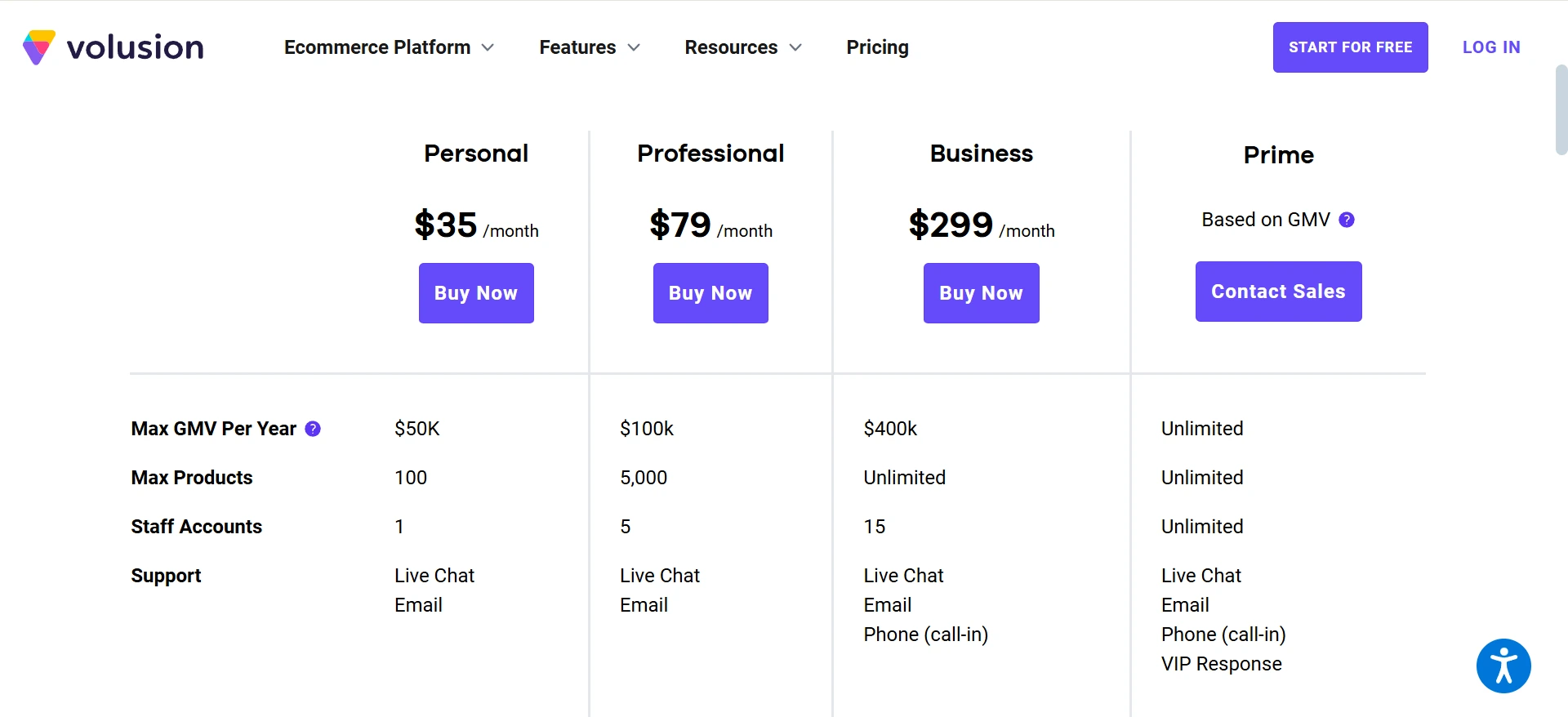
As you may see, Volusion pricing is predictable and beginner-friendly which simplifies cost management for small to medium-sized businesses. However, some lower-tier plans include transaction fees, which can reduce profitability for stores with high sales volumes. Additionally, it might not offer the same level of scalability or customization as Magento.
➤ The verdict:
Between Magento vs Volusion in the pricing dimension, Volusion is the better choice for businesses seeking a straightforward, all-inclusive solution. Its transparent subscription plans and managed services are perfect for small to medium-sized stores or those without technical expertise.
Ease of Use
Ease of use is one of the most critical factors when choosing an eCommerce platform, especially for business owners without technical expertise. In the comparison between Magento vs Volusion, both platforms approach usability differently, catering to distinct audiences.
Magento is a powerful platform, but its complexity can be a challenge for beginners. Its open-source nature gives you complete control over customization, but it also means you’ll need to handle tasks like hosting, security, and updates manually.
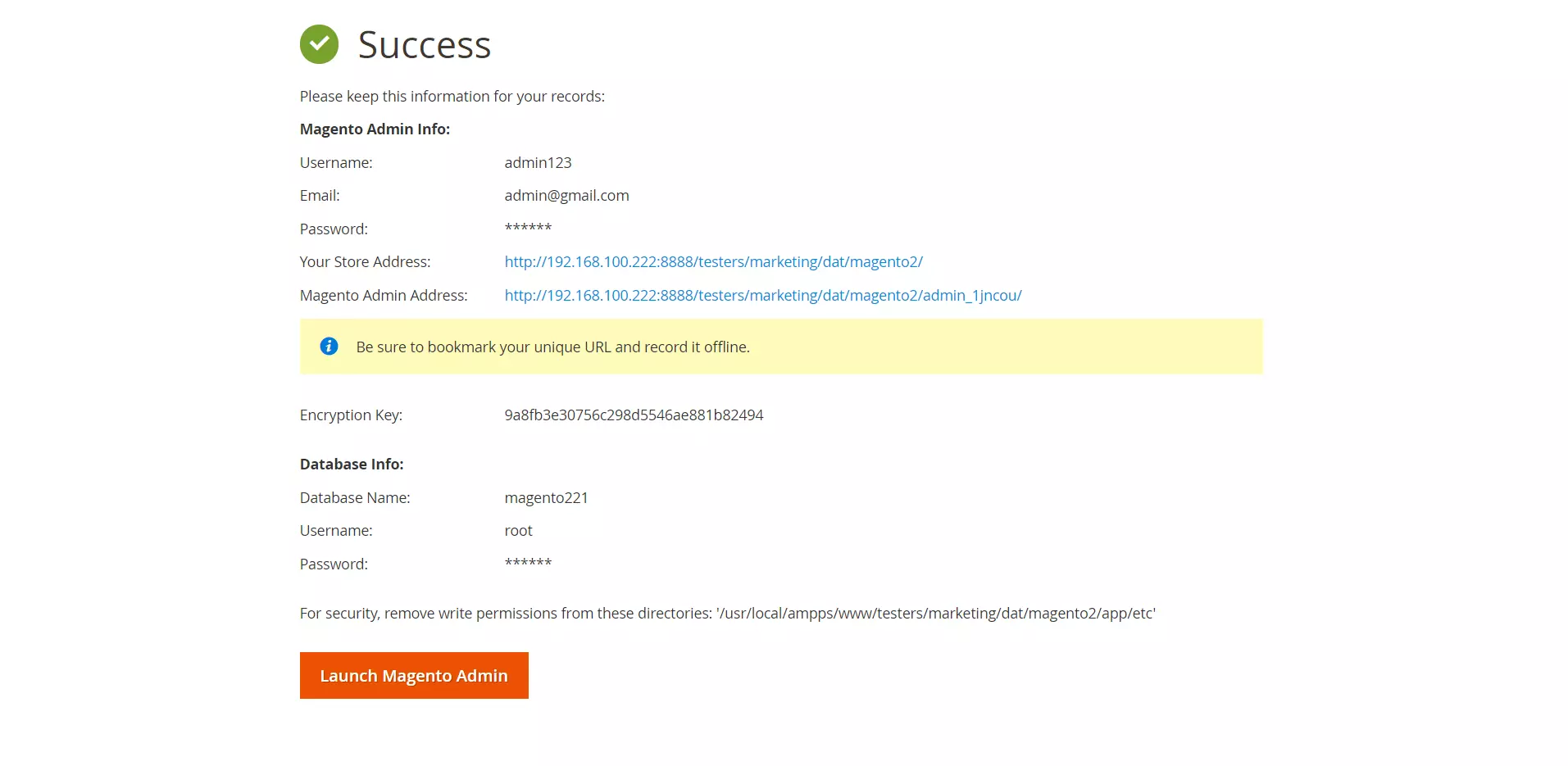
Therefore, setting up and managing a Magento store often requires technical expertise or assistance from developers. For businesses with in-house technical teams or the budget to hire experts, Magento’s flexibility and potential outweigh its complexity. However, for users without these resources, the learning curve can feel overwhelming.
On the other hand, Volusion is specifically designed for ease of use. It offers an intuitive dashboard with drag-and-drop tools, making it simple to build and customize your store without technical skills. The platform also includes guided tutorials and built-in tools for tasks like adding products, processing orders, and managing inventory.
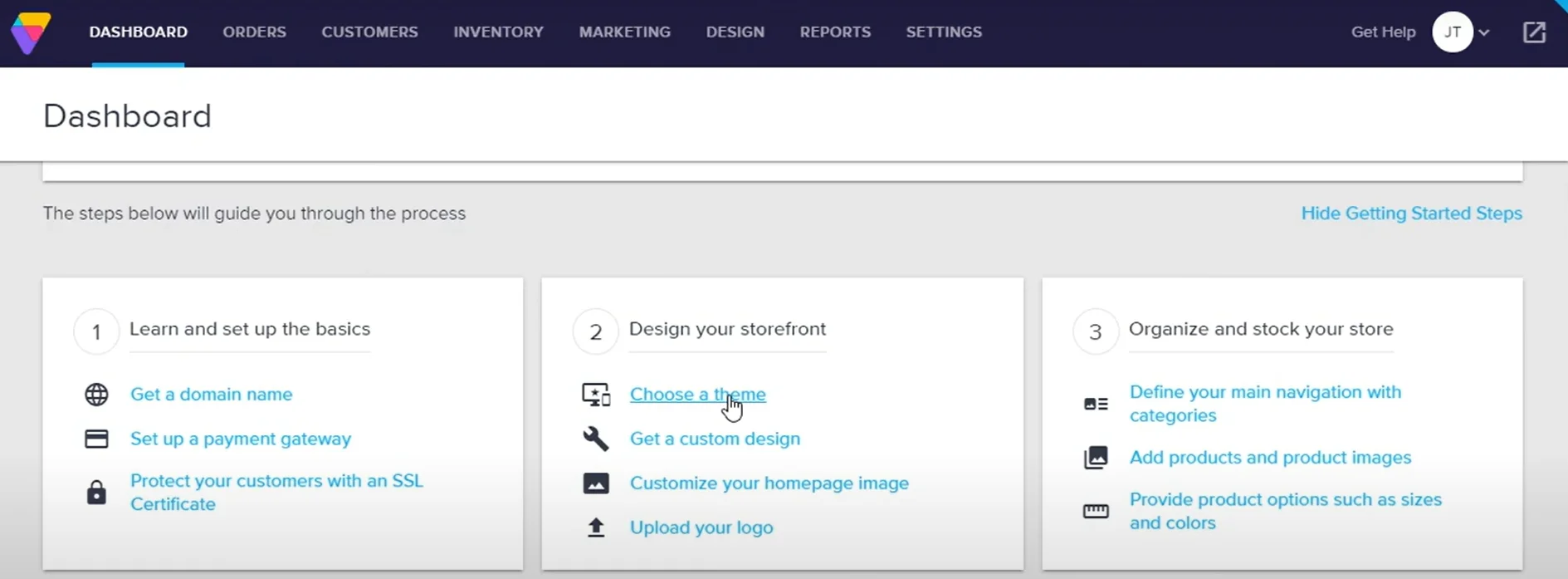
Volusion’s all-in-one hosting solution means you don’t need to worry about managing technical aspects like updates or security. This simplicity makes it an attractive option for small business owners, solopreneurs, or beginners who want to focus on running their business rather than handling technical complexities.
➤ The verdict:
When it comes to Magento vs Volusion in ease of use, Volusion is the clear winner. Its intuitive design, drag-and-drop tools, and managed services make it ideal for beginners or small businesses looking for a simple and straightforward solution.
eCommerce Features
Inventory management
Effective inventory management is crucial for the smooth operation of any eCommerce store. When comparing Magento vs Volusion in this area, Magento shines with its advanced and customizable features, making it an ideal choice for businesses with complex inventory needs. On the other hand, Volusion offers basic tools that may suffice for smaller businesses but lack the flexibility and depth of Magento's inventory management system.
To be specific, Magento offers a range of powerful inventory management features that can be tailored to meet the needs of growing businesses:
- Real-time stock updates: Magento provides real-time inventory updates, which ensures that stock levels are always accurate. This minimizes the risk of overselling and improves customer satisfaction by keeping shoppers informed about product availability.
- Advanced stock control: Magento allows for the management of multiple warehouses or stock locations, helping businesses track inventory levels across various locations. This feature is particularly useful for businesses with physical stores or warehouses spread across different regions.
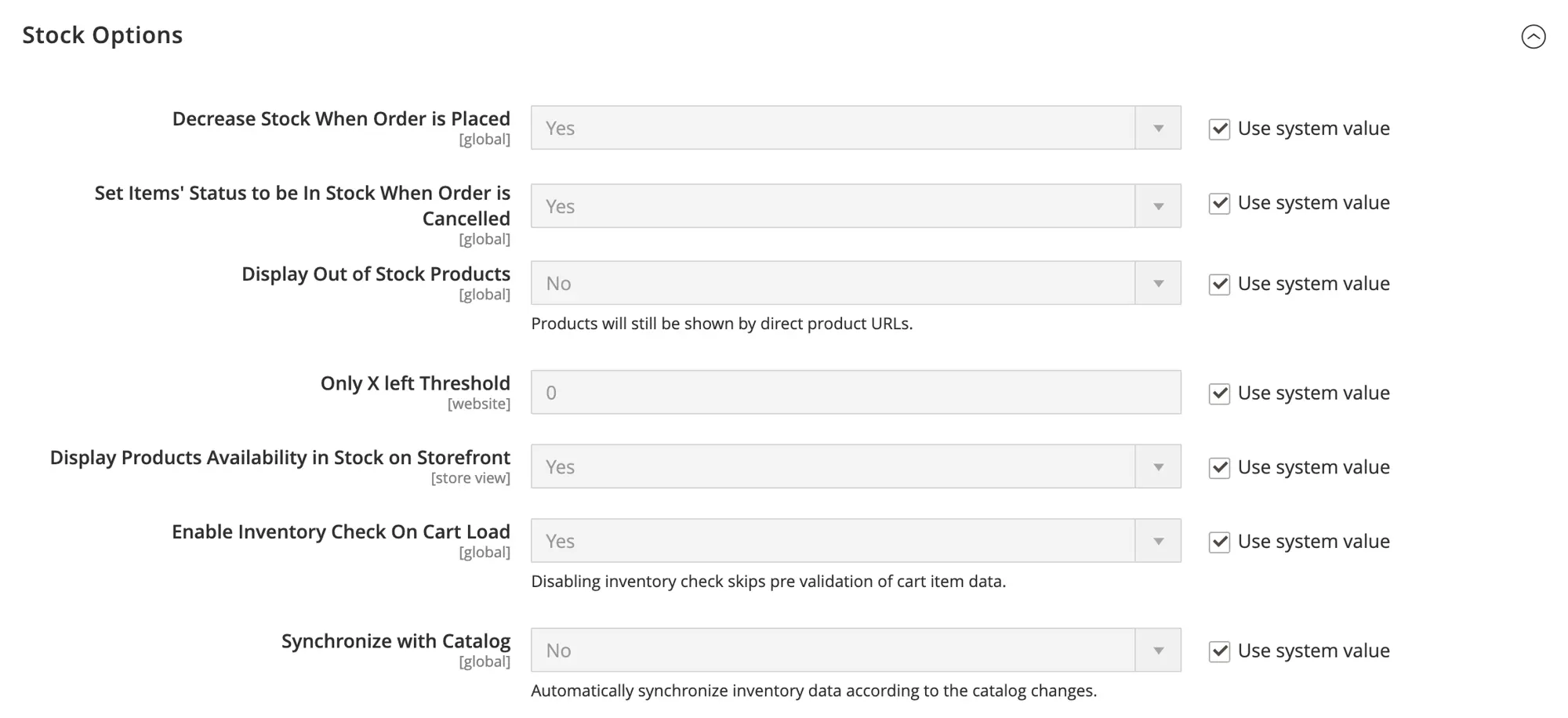
- Customizable inventory rules: Magento lets businesses create custom inventory rules based on their specific needs. For example, you can set reorder points, define minimum stock thresholds, and receive alerts when it’s time to restock, helping prevent stockouts or overstocking.
- Batch and serial number tracking: Magento also allows businesses to track products by batch numbers or serial numbers, an essential feature for managing high-value or regulated products. This adds an extra layer of organization and control, ensuring compliance and improving product traceability.
Now let's talk about Magento's counterpart in the Magento vs Volusion comparison. Volusion, while offering essential inventory management tools, does not provide the same level of customization or complexity as Magento. Its simplicity makes it more accessible for smaller businesses with straightforward inventory needs, but businesses dealing with large volumes of products or multiple sales channels may find Volusion's features limiting.
- Basic stock control: Volusion allows businesses to track inventory levels for each product, ensuring that stock levels are updated automatically when orders are placed. This helps prevent overselling and keeps inventory data accurate.
- Low stock alerts: Volusion notifies users when stock levels fall below a certain threshold. This helps businesses stay on top of restocking needs and avoid stockouts.
- Manual stock adjustments: Volusion allows users to manually adjust inventory levels when necessary, such as for returns, damaged goods, or physical inventory checks. This flexibility helps businesses keep inventory data accurate.
- Multi-location inventory (available on higher plans): Volusion allows businesses to manage inventory across multiple locations, such as retail stores or warehouses, helping businesses track stock levels in different places.
➤ The verdict:
Between Magento vs Volusion in terms of inventory management, Magento is the winner. Its advanced stock control, real-time updates, customizable rules, and additional features like batch tracking make it the superior choice for businesses with complex inventory needs.
B2B features
When it comes to catering to the B2B market, the Magento vs Volusion comparison highlights some clear differences. For businesses involved in wholesale, manufacturing, or complex business-to-business transactions, Magento offers a much more powerful and flexible suite of B2B tools. While Volusion does provide basic B2B functionalities, it is Magento’s advanced features that truly set it apart for companies with specific B2B needs.
Magento’s open-source nature allows for full customization of B2B features, providing businesses with a wide selection of capabilities to serve their enterprise clients more effectively. Magento B2B features include:
- Custom pricing: Magento enables businesses to set custom pricing for each customer based on their relationship with the company, order volume, or negotiation. This functionality is crucial for B2B transactions where bulk orders often come with special pricing terms.
- Customer segmentation: Magento allows you to create customer groups and apply specific pricing, discounts, or promotions for each group. This is essential for B2B businesses that have different pricing models for different types of clients.

- Bulk ordering: With Magento, B2B customers can easily order in bulk with custom order forms or catalog views. This feature streamlines the ordering process and improves efficiency for businesses handling large orders.
- Quotes and negotiations: Magento allows businesses to offer a quoting system where B2B customers can request quotes for their orders. These quotes can be negotiated and converted into orders once agreed upon, a feature that is essential for many B2B transactions.
- Advanced shipping and payment options: Magento supports complex shipping rules and payment options tailored to B2B needs. For instance, businesses can manage multiple shipping methods and integrate advanced payment gateways that are often used in B2B transactions.
Meanwhile, its counterpart in the Magento vs. Volusion comparison only provides basic B2B features that are not as robust. Volusion does support bulk ordering, customer groups, and discounting, but it lacks advanced tools like custom pricing, the ability to create detailed customer profiles, and a comprehensive quoting system. Therefore, this platform is better suited for businesses that don’t require heavy customization or in-depth B2B functionality.
➤ The verdict:
Between Magento vs Volusion in B2B features, Magento is more advanced. Its extensive suite of tools and customizability make it the top choice for businesses in the B2B space. Magento allows for detailed pricing models, bulk ordering, and quoting systems, which are critical for wholesale or business-to-business transactions.
Payment options
In terms of payment options, Magento provides significantly more flexibility and customization than Volusion. This platform supports a wide range of Magento payment gateways, including PayPal, Stripe, Authorize.net, and Square, making it ideal for businesses catering to diverse customer preferences. It also offers multi-currency support and integrates with alternative payment methods like Apple Pay, Google Pay, and cryptocurrency gateways, making it a strong choice for global or tech-savvy markets.
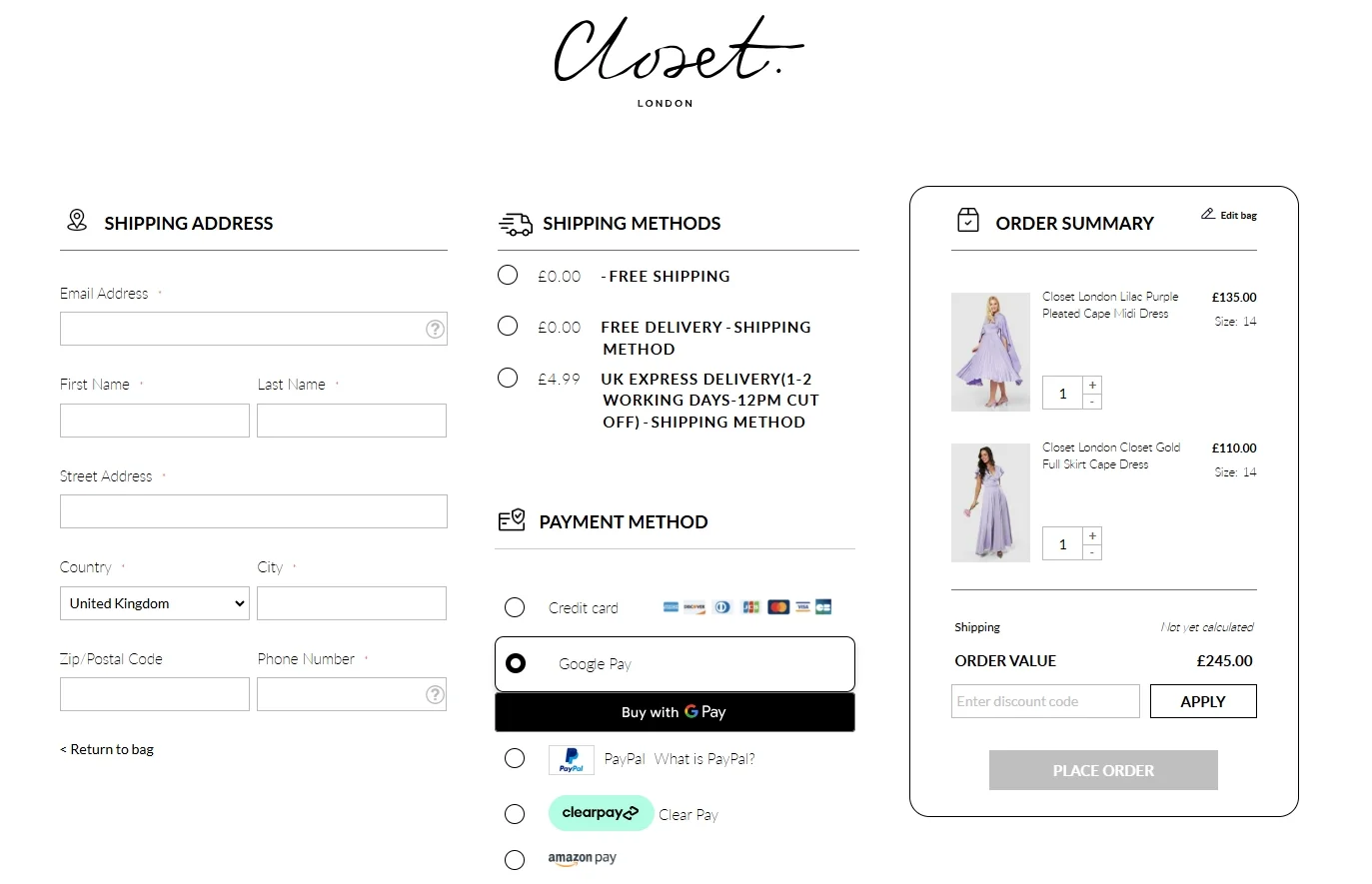
Additionally, Magento allows businesses to create custom payment workflows, integrate fraud prevention tools, and offer “Buy Now, Pay Later” options like Klarna, enhancing the checkout experience.
Volusion, on the other hand, simplifies payment management with built-in gateways like PayPal and Stripe. It eliminates transaction fees on higher-tier plans and ensures PCI compliance for secure payments. The platform’s streamlined setup is beginner-friendly, making it a good option for smaller businesses or entrepreneurs seeking simplicity.

However, Volusion’s limited gateway integrations and lack of advanced payment options can restrict its appeal to businesses with complex payment needs or global customers.
➤ The verdict:
Magento wins between Magento vs Volusion in the payment options category thanks to extensive integrations, multi-currency support, and advanced customization. While Volusion is suitable for smaller businesses that value simplicity, it falls short in flexibility and global capabilities. Therefore, for businesses with more complex or international payment requirements, Magento is the better choice.
Themes and Templates
When comparing Magento vs Volusion in terms of themes and templates, both platforms offer distinct advantages depending on your design needs and technical expertise.
Magento provides a highly flexible and customizable approach to themes and templates. With this platform, businesses can choose from a wide range of free and premium themes available on the Magento Marketplace or third-party providers. These themes are designed to be fully customizable, allowing developers to modify layouts, color schemes, and functionality to align perfectly with the brand’s identity.
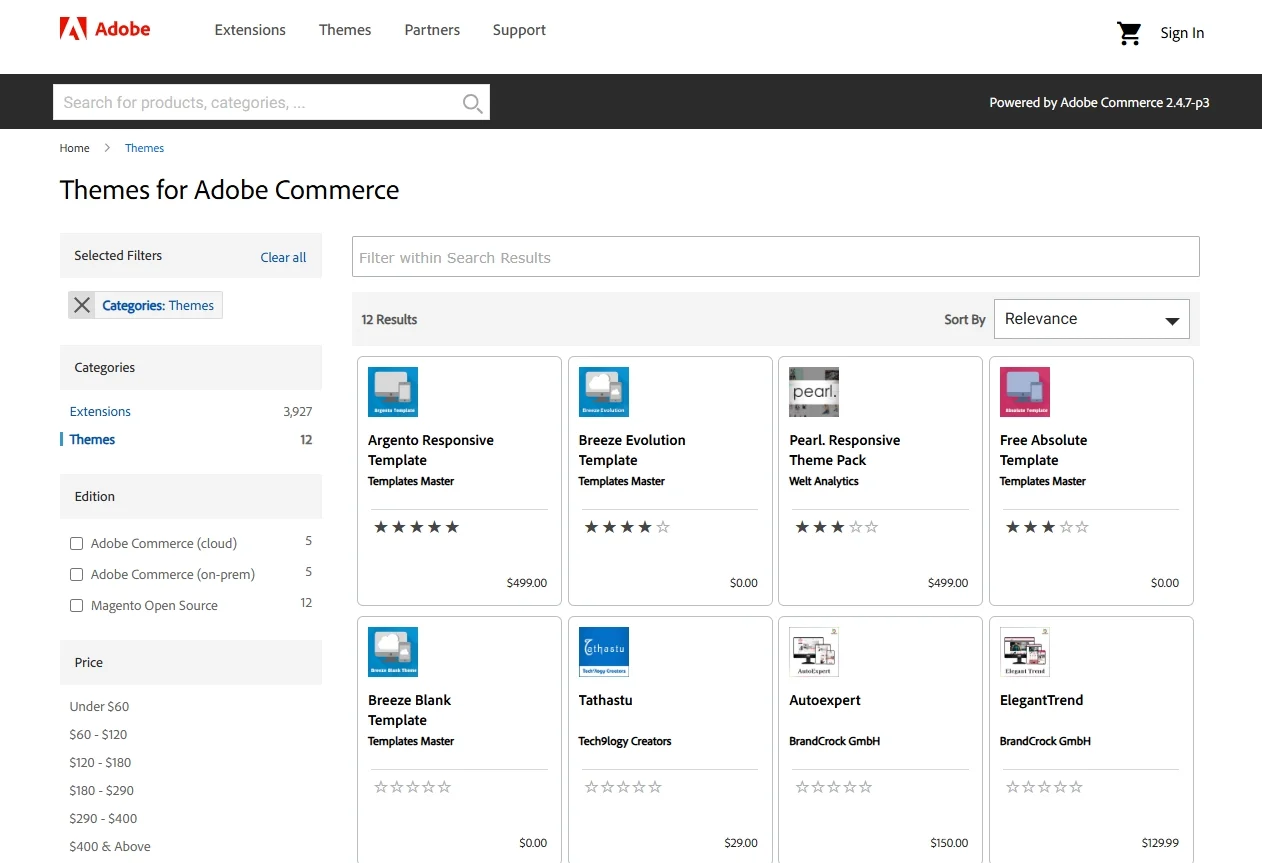
However, this level of flexibility requires technical skills or the assistance of a developer, making it more suitable for businesses with in-house expertise or the budget to hire professionals.
Volusion, in contrast, focuses on simplicity and ease of use. The platform offers a selection of pre-designed templates, many of which are mobile-responsive and visually appealing. These themes are easy to install and edit through the platform’s drag-and-drop builder, allowing users to make changes without any coding knowledge.

However, the range of templates is more limited compared to Magento, and the customization options are not as extensive. Businesses with specific design needs may find these limitations restrictive.
➤ The verdict:
When it comes to Magento vs Volusion between themes and templates, Magento is the better choice for businesses that prioritize customization and brand-specific designs. Its flexibility and extensive range of themes cater to businesses that want complete control over their store’s appearance.
However, for small businesses or entrepreneurs seeking simplicity and ease of use, Volusion offers a quick and efficient solution.
SEO & Marketing Functions
In the comparison of Magento vs Volusion in SEO & Marketing functions, both platforms offer features to help businesses promote their stores and optimize for search engines, but their approaches differ significantly.
Magento excels in providing advanced SEO tools and marketing functionalities. The platform allows businesses to customize every aspect of their SEO strategy, from URL structures to meta tags and alt attributes for images. Magento supports XML sitemaps, robots.txt files, and rich snippets, ensuring that your store is optimized for search engine crawlers.
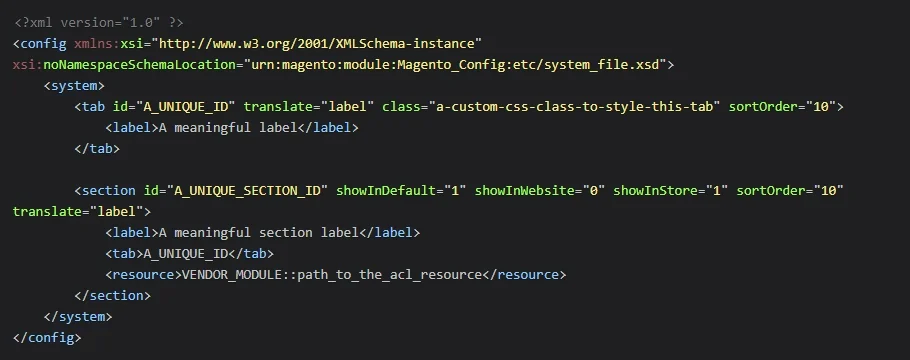
Additionally, Magento integrates seamlessly with third-party SEO tools, enabling businesses to implement sophisticated strategies for improving organic visibility. Its marketing capabilities include personalized email campaigns, customer segmentation, and abandoned cart recovery, all of which help drive conversions.
Volusion, on the other hand, simplifies SEO and marketing for beginners. The platform includes basic tools like editable meta tags, SEO-friendly URLs, and an integrated blogging feature. Volusion also provides built-in reporting tools to track traffic and search engine performance, making it easier for small businesses to monitor their efforts.
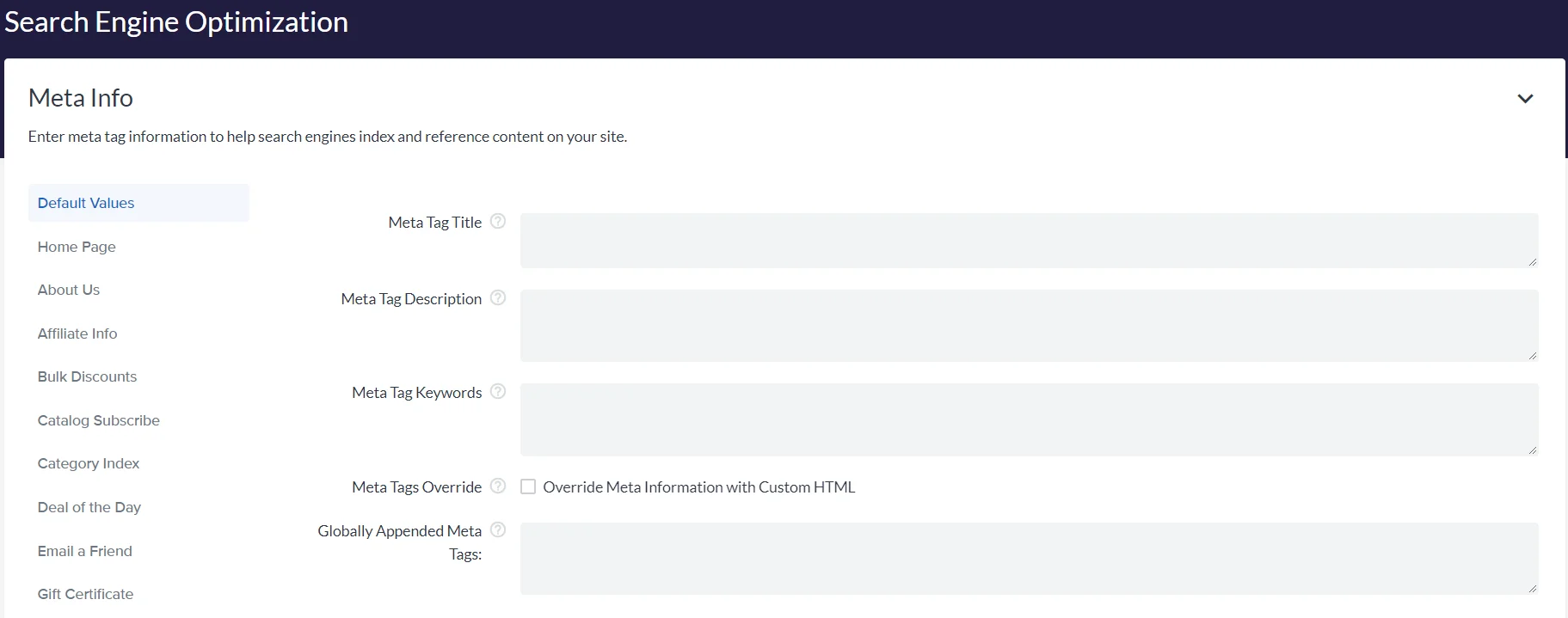
For marketing, Volusion includes features like discounts, promotions, and email marketing, which are simple to set up and manage. However, the platform lacks the depth of customization and advanced options that Magento offers, which can limit its effectiveness for larger businesses or those with more ambitious growth goals.
➤ The verdict:
In the Magento vs Volusion comparison in SEO and marketing functions category, Magento is the winner for businesses looking for advanced, customizable tools to implement a comprehensive digital marketing strategy. Its robust SEO features and integration options make it a powerful choice for driving organic traffic and managing complex campaigns.
Apps & Integrations
When it comes to apps and integrations, Magento vs Volusion reveals significant differences in depth and flexibility. Magento stands out with its extensive ecosystem of third-party integrations and add-ons, while Volusion offers a more streamlined but limited selection of tools.
Magento provides unmatched flexibility through its vast library of extensions and integrations. As an open-source platform, it supports thousands of third-party Magento extensions, tools, and custom integrations available on the Magento Marketplace. Businesses can extend their store’s functionality in areas such as marketing, payment processing, analytics, shipping, customer support, and more.
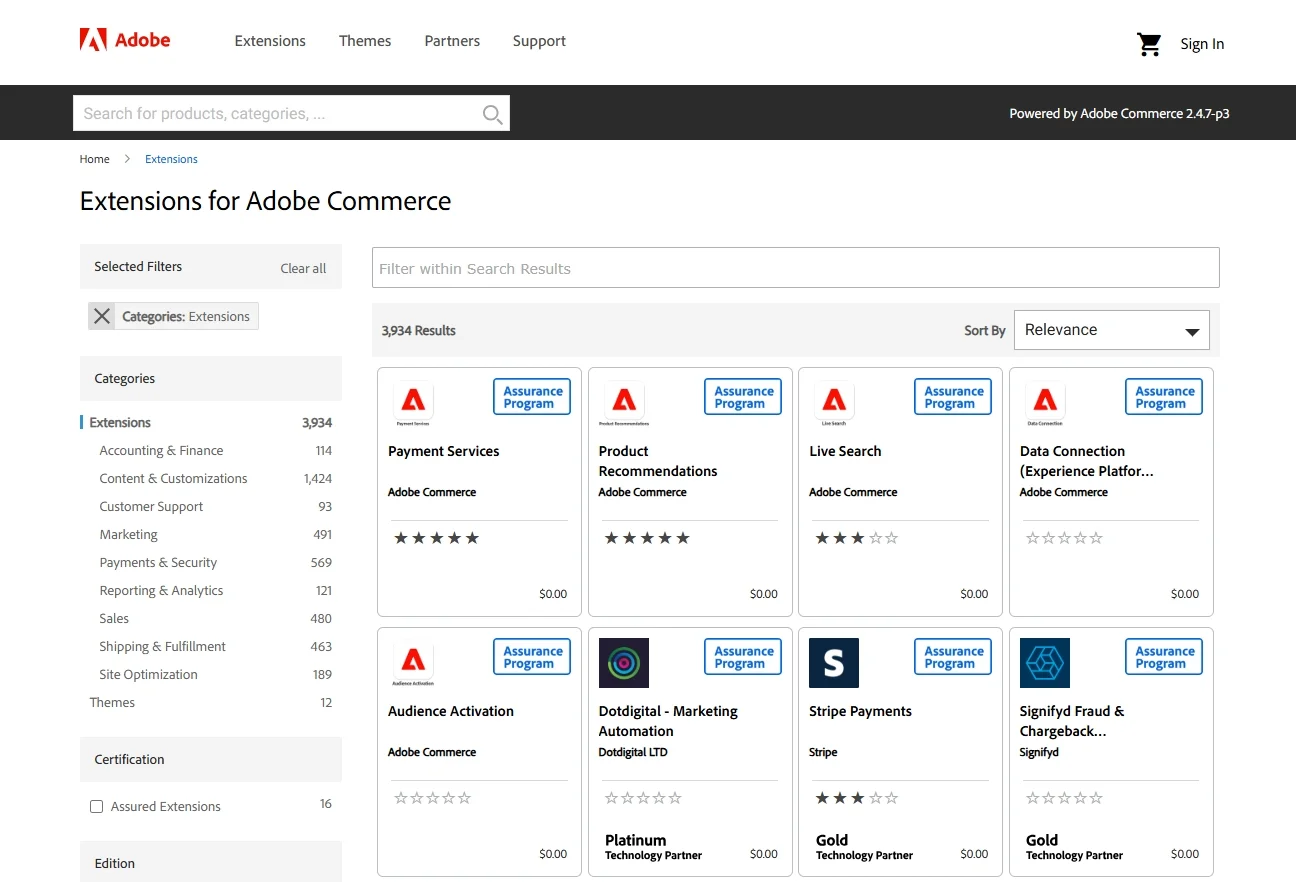
On top of that, Magento’s open architecture also allows developers to build custom integrations to meet unique business needs. This makes Magento ideal for businesses that require tailored workflows or advanced features to scale effectively.
In contrast, Volusion offers a smaller, built-in set of apps and integrations designed for simplicity and ease of use. The platform includes essential tools for email marketing, payment gateways, and basic analytics. Volusion integrates with popular services like PayPal, Stripe, and social media platforms, providing the core functionality needed for most small businesses.
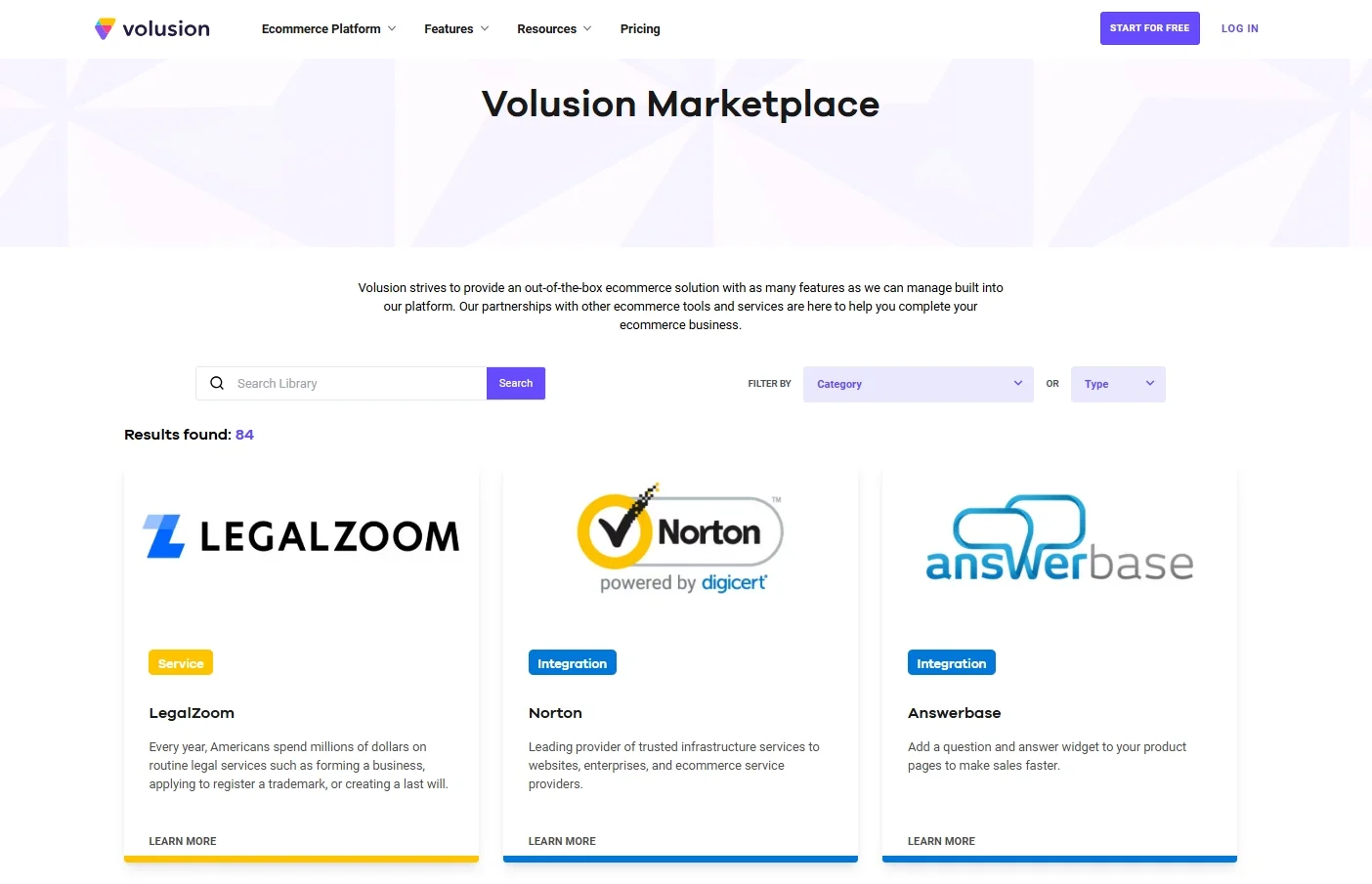
However, the platform lacks the wide variety of third-party apps and advanced integrations available with Magento. Businesses with complex requirements may find Volusion’s options limiting.
➤ The verdict:
Between Magento vs Volusion in the apps and integrations category, Magento is the clear winner. Its extensive marketplace, open architecture, and ability to support custom integrations provide businesses with unparalleled flexibility to extend their store’s functionality.
Security
In the comparison between Magento vs Volusion, both platforms address security but take different approaches depending on their structure and user base.
Magento offers advanced security features but places much of the responsibility on the store owner. As an open-source platform, Magento allows you to implement custom security measures tailored to your business needs. You can install security patches, configure SSL certificates, and integrate third-party security tools to enhance protection. Magento also supports advanced security extensions that offer features like two-factor authentication (2FA), data encryption, and real-time monitoring to protect against vulnerabilities.
With that being said, maintaining a secure Magento store requires technical expertise and proactive management. Businesses need to regularly apply updates and patches to stay ahead of potential threats, which can add to maintenance costs.
In contrast, Volusion takes a more hands-off approach by managing security for its users. As a hosted platform, Volusion ensures that all stores are PCI-compliant and provides built-in SSL certificates to secure customer transactions. Security updates are handled automatically by Volusion, reducing the burden on store owners. This is ideal for small to medium-sized businesses or beginners who don’t have the resources or expertise to manage complex security systems.
➤ The verdict:
When it comes to Magento to Volusion in terms of security, Volusion wins for businesses looking for an easy, hands-off solution where security is managed automatically. Its built-in PCI compliance and automatic updates make it a great choice for smaller businesses.
Support
When comparing Magento vs Volusion in terms of support, the two platforms handle customer assistance in distinct ways. Volusion offers direct, hands-on support, while Magento leans more on community resources and premium support services.
Volusion is designed to simplify support for its users, especially small to medium-sized businesses or beginners. The platform offers multiple direct support channels, including live chat, phone support, and email assistance, depending on your pricing plan. Volusion’s team is available 24/7 on higher-tier plans, ensuring quick responses to technical issues or questions.
Additionally, Volusion provides onboarding resources, such as guides, tutorials, and a knowledge base, making it easier for users to set up and manage their stores. This hands-on approach is ideal for businesses that lack in-house technical expertise and need reliable, responsive assistance.
In contrast, Magento takes a different approach to support. The Magento Open Source version does not include direct customer support, which means users rely on community forums, developer resources, and third-party agencies for assistance. Magento has a large, active community with extensive documentation and forums where users can find solutions to common problems.
➤ The verdict:
In the support dimension, Volusion is the clear winner for businesses that need direct, hands-on assistance. Its responsive customer support channels and user-friendly onboarding make it a great choice for beginners or smaller businesses.
Magento vs Volusion – FAQs
Which platform is more suitable for small businesses, Magento or Volusion?
Volusion is generally more suitable for small businesses due to its user-friendly interface and all-in-one hosted solution, which simplifies setup and maintenance. Magento, while powerful and highly customizable, often requires more technical expertise and resources, making it better suited for medium to large enterprises.
What is the disadvantage of Magento?
Magento’s primary disadvantage is its complexity. It requires technical expertise for setup, customization, and maintenance, which can be a challenge for non-technical users. Additionally, Magento’s flexibility comes with higher costs, as businesses need to invest in hosting, development, and ongoing maintenance. These factors make Magento less suitable for small businesses with limited resources.
Is Magento expensive?
Magento can be considered expensive depending on your business size and requirements. The platform itself offers a free open-source version, but the associated costs for hosting, development, and maintenance can add up quickly.
Final Verdict
When evaluating Magento vs Volusion, the right platform for your business depends on your specific goals, technical capabilities, and growth expectations. Both platforms excel in different areas, making them suitable for distinct types of users. In the end, Magento is the better choice for businesses that require advanced control and scalability, while Volusion is a great option for those seeking simplicity and a quick, manageable solution.
If you like this topic, please check out other Magento articles on our website to get more expert tips and insights.

